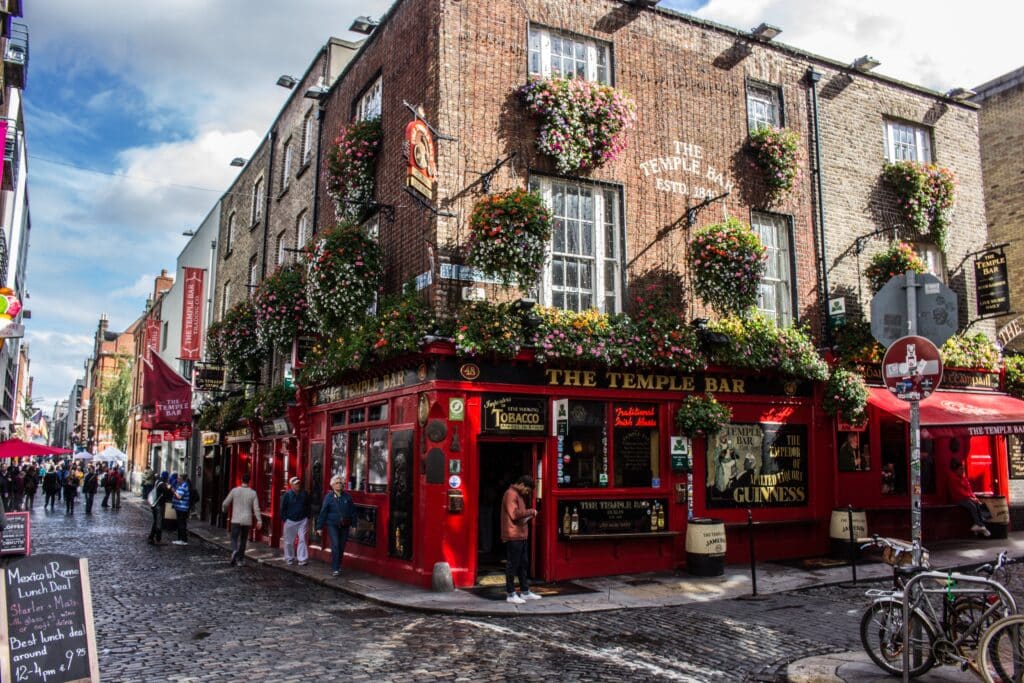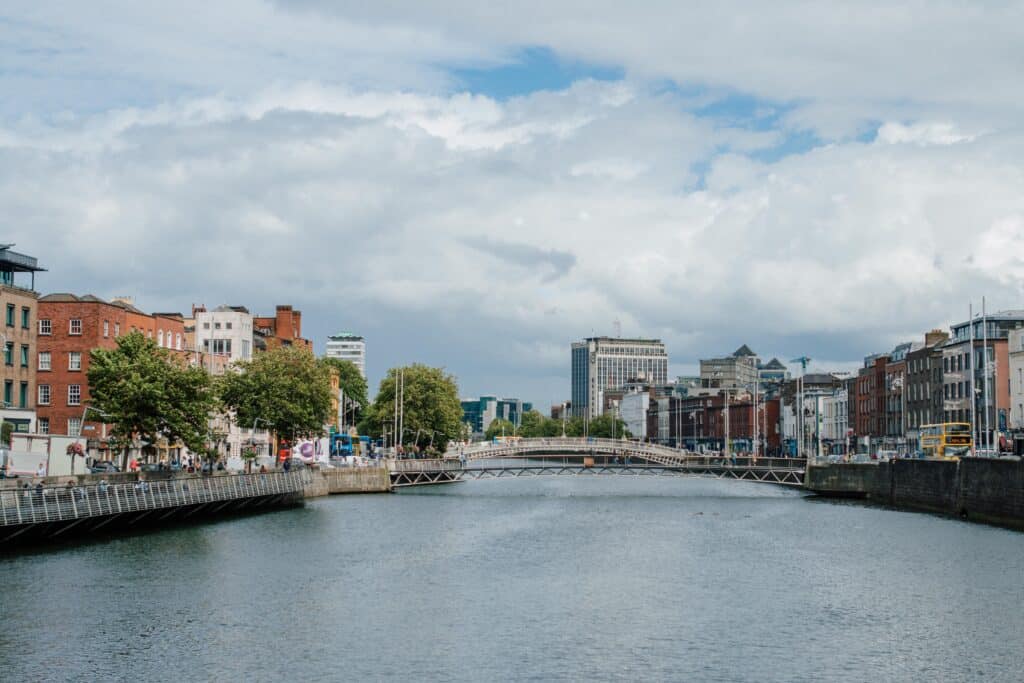Welcome to Ireland, an emerald island nestled in the heart of the North Atlantic. Here, scenic green landscapes harmoniously coexist with unrivaled human hospitality and a thriving economy. In recent years, Ireland has become a popular destination for major multinationals and expatriates from all over the world. Foreigners are attracted by the economic potential of the Celtic Tiger as well as by Ireland’s rich culture and excellent quality of life.
So how do you relocate to Ireland? What is the cost of living? What’s the weather like? What is the best place to live? Is public healthcare free for expats?
If you plan to move to Ireland to live and work, Foyer Global Health is here to answer your questions and guide you to make your relocation smooth, whether you’re alone, in a couple or a family.
It is important to note that the information provided here specifically applies to the Republic of Ireland. If you plan to move to Northern Ireland, a constituent nation of the United Kingdom, you will find information here.
Formalities
Visas and permits
Ireland is part of the European Union. As a result, all European expatriates (EU + EEA) do not need a visa or residence permit to relocate to the country. As an American, just as any non-EU/EEA national, you will need to apply for a long-stay visa (D permit) if your stay exceeds three months.
For more detailed information, please visit the website of the Irish Immigration Services.
The PPSN (Personal Public Service Number)
Upon your arrival in Ireland, it is necessary to obtain a personal service number. This number is essential for working in Ireland, accessing social and healthcare services, and being recognized by local tax authorities. To obtain your PPSN, you can schedule an appointment online.
Living in Ireland: Pros & Cons
Advantages
- Ireland is a beautiful country: from sublime coastlines to picturesque lakes, medieval cities and lush green valleys.
- With a thriving job market: Ireland has a lot to offer in terms of job opportunities
- Fascinating culture and a vibrant social life
- Warm and welcoming people: the Irish are known for their hospitality, and you’ll forge lifelong friendships!
- A very active international community of expats
- Great geographical location with easy access to other European countries for travel

Disadvantages
- High cost of living: real estate can be very expensive especially in Dublin
- Housing crisis in major cities such as Dublin and Cork
- Unpredictable weather: you’ll experience the famous “four seasons in one day” phenomenon and high humidity levels
Moving to Ireland: Which city to live in?
Dublin is a top choice among expatriates seeking to boost their careers while immersing themselves in a vibrant social and cultural scene. One third of Ireland’s population lives in the capital. It also serves as an excellent hub for exploring the rest of Europe. However, it is important to note that the costs are considerably high in Dublin and housing options are limited. Despite this, Dublin provides a better quality of life compared to London and offers greater opportunities.



Some people prefer Cork, Ireland’s second-largest city, for its lively, trendy, family-friendly and relaxed atmosphere. With a flourishing presence of multinational companies and a plethora of cultural activities, Cork provides a welcoming environment for expats. With its beautiful scenery, tranquil atmosphere and Michelin-starred restaurants, the city of Galway is a great place to live for couples and singles alike from abroad. Other cities like Westport, Malahide and Skerries also offer an excellent quality of life, allowing individuals to seamlessly combine work and outdoor activities.
Accommodation
In Ireland, the availability of housing options, including studios, flats, houses, is very limited, while the demand remains high, resulting in high rental costs, particularly in major cities like Dublin where real estate is expensive. It is recommended to look for accommodation once you are in the country as online listings may not exactly match what you are looking for. Some people prefer to rent an Airbnb for a short period of time while they actively seek suitable long-term accommodation. In cities such as Dublin or Cork, young professionals prefer to share accommodation. If you venture into urban suburbs or rural areas, you are more likely to find houses with gardens.
Useful links:
Working in Ireland
Since the end of the economic recession in the late 2000s, Ireland has experienced a remarkable period of sustained economic growth, boasting a thriving job market. Whether in technology, international business and financial services or pharmaceuticals, Ireland offers abundant job opportunities for expats. It is home to giants such as Google, Apple, PayPal, Amazon, and Horizon Pharmaceutics, as well as a thriving start-ups scene.
As an expat, you will find great work opportunities, especially if you speak English and have solid work experience in one of Ireland’s thriving industries.
Ireland is entrepreneur-friendly, that’s why many expats choose to establish their own business in the country. Procedures to create a company are simplified, corporate taxes are highly favorable (12.5%, one of the lowest globally) and there are subsidy and funding programmes available (e.g. the Startup Entrepreneur Program).
Ireland is also an ideal destination for digital nomads, as it offers a range of co-working spaces, particularly in major cities such as Dublin, Cork and Galway. This system of hot-desking allows freelancers to enjoy the flexibility and freedom to work remotely without the constraints of a regular office or job.
Healthcare in Ireland

The Irish public healthcare system is funded through contributions and managed by the Health Service Executive (HSE). It is important to note that this system is not universally available. To be eligible for public health insurance, specific conditions must be met, including a minimum length of residence in the country (of at least one year) and income thresholds.
As an expat, you will qualify for public health insurance after one year’s residence, and if you don’t meet the criteria for the medical card (which is reserved for individuals with low income), you won’t have free access to healthcare services and you will have to cover the costs of your treatment.
In fact, approximately 40% of Irish residents subscribe to a private health insurance policy, one of the highest rates in Europe. Most expats opt for international health insurance, which is the best solution for coverage from the moment they arrive in Ireland. Foyer Global Health stays by your side both in Ireland and abroad.
Some Irish specificities:
- The Irish people are renowned for their warm hospitality and extraordinary sense of humour
- The pub holds a central place in Irish social life
- “Craic” is a quintessential Irish term that represents something fun, enjoyable and a good time, just like the Irish people!
- The Sunday Sessions: on Sundays, traditional music fills the pubs
- Irish is the first official language of Ireland
Best things to discover
- Hike in Killarney National Park
- Admire the cliffs of Slieve League and Moher
- Play a round of golf (Ireland is a popular destination for golfers worldwide)
- Follow the Antrim coastal path
- Indulge in the hospitality of Dublin
- Travel to the Connemara Peninsula with your family
- Stroll through Cork’s English Market
- Plan a scenic drive through County Sligo
- Visit Blarney Castle (Ireland boasts around 30,000 castles!)
- On 17 March, join the festivities of St Patrick’s Day, the biggest festival of the year
